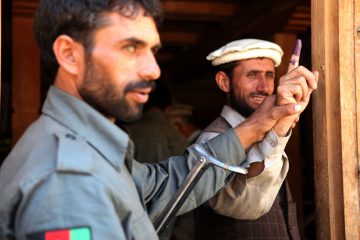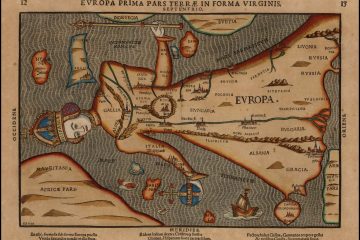
Determinants of Public Legitimacy: Survey Evidence from Afghanistan
Researchers: Jasmine Bhatia, with Professor Nancy Bermeo and Dr Akitaka Matsuo (Department of Methodology at the London School of Economics and Political Science) Funder: International Growth Centre (Additional support received from Nuffield College) For a state to succeed, its people must have trust in its institutions. The development of legitimate state institutions at both national and subnational levels is critical, but often leaders of fragile states and international donors lack information about what the public want from those institutions. This project hopes to shed light on the key components of public legitimacy by conducting fieldwork in Afghanistan, a state where the public institutions’ lack of legitimacy is undermining the ability of the state to govern effectively. The project uses a series of survey …

Putting Frontier Research into Action: Co-designing Security Policies to Tackle Violent Non-state Groups in Peripheral Spaces
Researcher: Dr Annette Idler Funder: Higher Education Innovation Fund External Partners: United Nations (UN System Staff College and UN Colombia) Conflicts involving militias, paramilitaries, rebels, cartels, or terrorist organisations (collectively referred to as violent non-state groups) are the most lethal form of violence in the world today. The fierce urgency of current crises demonstrates the need to learn lessons from those conflicts which have been peacefully resolved. In Colombia, peace negotiations between Colombia’s government and the rebel group FARC hold out the promise of an end to more than five decades of violent conflict, which has left 220,000 dead and produced a refugee crisis second in scale only to that of Syria. Colombia’s borderlands are the regions that have been …

Passions and Interests? Emotional Politics and Politicized Emotion in Sino-Japanese Relations
Researcher: Professor Todd H. Hall Funder: Abe Fellowship, Social Science Research Council (USA) As the world’s second and third largest economies, and neighboring naval powers with expanding military capabilities, the relationship between Japan and the People’s Republic of China is arguably one of the most significant in the international realm. Cooperation between the two countries could deliver strong mutual benefits in security, economic development and environmental protection. And yet, the relationship between Japan and China has been prone to repeated episodes of mistrust, tension and mutual recrimination. Why? Within the discipline of International Relations, three factors are commonly used to explain the instability of relations between Japan and China: security issues, economic ties, and emotion. But while much scholarly attention …

Does leadership in peacekeeping matter?
Researcher: Professor Andrea Ruggeri Funder: British Academy Does diversity in the composition of UN peacekeeping operations affect their ability to resolve conflicts? Does a cultural distance between mission leadership and the national contingents make it easier or harder to stop conflict and protect civilians? Can differences between political and military leadership jeopardize a missions’ effectiveness? This project aims to create a comprehensive dataset on UN peacekeeping leadership in all the post-Cold War UN missions, including information on Secretary General Representatives and Military Chiefs. The research will explain how diversity within political and military leadership in UN missions affects their effectiveness in protecting civilians, and how diversity between UN mission leadership and peacekeepers on the field influences a mission’s capacity to protect …

Fairness and Voter Reactions to Government Opportunism
Researcher: Professor Petra Schleiter Governments the world over often behave opportunistically to increase their chances of re-election. Leaders may time elections to take advantage of favourable developments, exploit opposition weakness, or to “cut and run” before their popularity wanes. These tactics are often obvious and we would expect voters to disapprove of such strategies, since they seem unfair and could distort the role of elections as instruments of accountability. Anecdotal evidence also suggests that prime ministers fear such reactions. But how do considerations of fairness affect voter responses to government opportunism? To date, this question remains completely unexplored. This project uses a survey experiment to shed light on the importance of fairness in voter reactions to opportunism, particularly focusing on …

How to allocate resources for policing
Researcher: Professor Iain McLean with Anika Ludwig (Research Officer, Nuffield College) and Mike Norton (PhD candidate) Funder: Chartered Institute of Public Finance and Accountancy (CIPFA) The forty-three Policing areas in England and Wales together spend over £11 billion a year. How do they decide to spend it? This project looks at resource allocation processes of the UK’s territorial police forces. Does the presence of a Police and Crime Commissioner make a difference to the ways police funds are spent? Is good practice in resource allocation effectively shared across the profession? The ways budget decisions are made may reflect regional priorities, differences in size, shape and organisational structure of police forces, or the presence or lack of systematic financial decision-making. Little …

How Europe’s Media Covered the Migration Crisis
Researcher: Caroline Lees Funder: Bosch Foundation On 2 September 2015, newspapers across Europe published images of the body of three-year old Aylan Kurdi, who drowned as his family tried to reach Europe. Did these images affect the media’s coverage of the refugee crisis? If so, what differences were there between European countries, and how was coverage influenced by the political leaning of newspapers? The research project “How Europe’s Media Covered the Migration Crisis” was a collaboration between EJO partner organisations on a study of how the media covered the migrant crisis. The project found that media sympathy for refugees, even after the devastating photos of the drowned boy on the beach, was largely superficial and fleeting. At the same time, the …

Mapping the Languages of European Memory
Researcher: Dr Félix Krawatzek Funder: John Fell Fund The European Union is facing fundamental challenges, many of which are driven by issues of identity and different perspectives on European history. But what is European history? This project seeks to understand which elements of the past are interpreted as being part of a European history, and how. Who drives a Europeanisation of history and what implications does this have for a sense of collective identity? European Memory refers to the ideas that people hold about what Europe represents. Rather than assuming that “Europe” has a fixed meaning and fixed boundaries, this research looks more closely at what “Europe” means when the term is used in public debate. What forms of shared …










